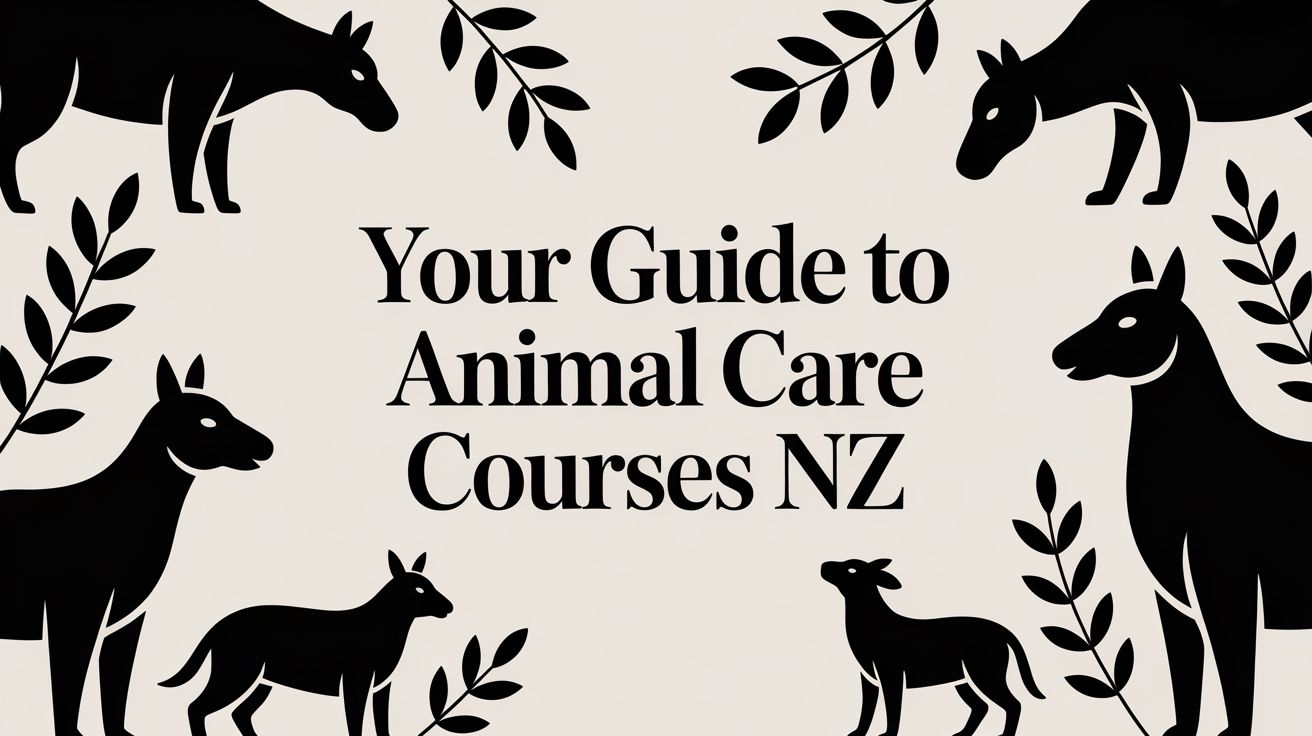
Your Guide to Animal Care Courses NZ
If you're dreaming of a career working with animals in New Zealand, you're on a deeply fulfilling path. The right training, however, is your crucial first step. This guide is here to map out the world of animal care courses in NZ, from foundational certificates that get your foot in the door to specialised diplomas for advanced careers in vet clinics, rescue centres, or even wildlife conservation.
Launching Your Career in Animal Care
Pursuing a career with animals is so much more than just a job—it's a genuine commitment to their welfare and wellbeing. Here in New Zealand, where we have incredibly strong animal welfare standards, a formal qualification is fast becoming a must-have for anyone serious about working in the industry. It’s a clear signal to employers that you have the essential knowledge and practical skills to provide professional, compassionate care.
Think of these qualifications as building your professional toolkit. A basic certificate gives you the fundamental tools—things like understanding animal behaviour, nutrition basics, and safe handling techniques. A more advanced diploma adds specialised instruments to your kit, preparing you for more complex tasks like assisting in veterinary procedures or managing an entire kennel facility. This structured learning makes sure you're not just relying on passion, but on proven, professional best practices.

Why Formal Training Matters
Let's be honest: simply loving animals isn't always enough to build a sustainable career. The industry demands a professional approach that’s grounded in science and ethics. Getting formally trained through an animal care course in NZ gives you several key advantages:
- Credibility with Employers: A recognised certificate or diploma proves your dedication and competence. It makes you a much more attractive candidate in what can be a competitive job market.
- Essential Knowledge Base: You’ll dive into critical subjects like animal anatomy, physiology, and health, as well as the legal responsibilities of animal ownership and care here in New Zealand.
- Hands-On Confidence: Practical placements are a core part of many great courses. They give you the chance to apply what you've learned in real-world settings, building your confidence in handling animals with all sorts of temperaments and needs.
A qualification is your passport into the professional animal care community. It validates your skills and shows you're serious about upholding the highest standards of animal welfare, which is a total non-negotiable in New Zealand's industry.
Consider this guide your comprehensive roadmap. We'll explore all the different types of courses available, from short micro-credentials to in-depth diplomas. We'll also look at the top providers, what you can expect to learn, the career paths that open up after graduation, and the practical steps for enrolment and funding.
Whether your dream is to work in a bustling vet clinic, a dedicated rescue centre, or a unique wildlife sanctuary, your journey starts with the right education. Let’s explore the qualifications that will help you turn that passion for animals into a truly rewarding profession.
Understanding Your Qualification Options
Choosing the right qualification can feel a bit overwhelming, but think of it like picking a trail on a map—each one leads to a different career destination. Navigating the world of animal care courses in NZ gets a whole lot easier once you understand the framework that holds it all together. Here in New Zealand, that's the New Zealand Qualifications Authority (NZQA) framework, which organises qualifications into different levels.
Picture these levels as a ladder. Each rung represents a step up in skill, knowledge, and responsibility. Starting on the first rung gives you a solid foundation before you climb higher, with each new level opening up exciting new career paths.
The Foundation: Level 3 Certificates
A Level 3 Certificate is the perfect entry point for anyone new to the professional animal care industry. It’s the foundational rung on the ladder, built to give you the essential, hands-on skills you need for entry-level roles. This qualification is a brilliant choice if you’re a school leaver, changing careers, or just want to turn your passion for animals into a recognised credential.
At this level, it’s all about the fundamentals. You’ll get stuck into key topics like:
- Basic Animal Husbandry: Learning the day-to-day routines of feeding, watering, grooming, and keeping environments clean and safe for all sorts of companion animals.
- Safe Handling Techniques: Building your confidence in how to approach, handle, and restrain animals correctly to keep both you and them safe.
- Animal Health and Behaviour: Learning to spot the signs of a healthy animal, recognise common health problems, and read basic animal body language.
- Welfare and Ethics: Getting to grips with the legal and ethical responsibilities of animal care in New Zealand, all guided by the Animal Welfare Act 1999.
Finishing a Level 3 certificate sets you up for roles like a kennel assistant, cattery attendant, pet store assistant, or an entry-level position at a rescue centre.
Stepping Up: Level 4 Certificates
If you've already got some basic experience under your belt or have finished a Level 3 qualification, a Level 4 Certificate is your next logical step. This level builds on that foundational knowledge, adding more complexity and asking for a greater degree of independent work. It’s designed to really deepen your expertise and get you ready for roles with more responsibility.
A Level 4 course dives into more specialised knowledge. You’ll likely explore more advanced concepts, such as:
- More in-depth animal anatomy and physiology.
- Advanced animal nutrition and how to plan diets.
- Assisting with basic veterinary nursing procedures.
- Managing animal behaviour and putting enrichment plans into action.
This qualification can open doors to roles like a senior animal care attendant, veterinary care assistant, or an animal control officer. It’s a fantastic bridge between foundational skills and higher-level diploma studies.
Advanced Skills: Level 5 Diplomas
Climbing to the top of the ladder, a Level 5 Diploma marks a major leap in expertise. These programmes are geared towards people aiming for technical, supervisory, or specialised roles within the animal care world. A diploma gives you comprehensive theoretical knowledge and advanced practical skills, allowing you to manage complex situations and even lead a team.
A diploma-level qualification tells employers that you not only have the practical ability to care for animals but also the critical thinking skills to manage welfare programmes, oversee facility operations, and contribute to higher-level animal health outcomes.
The curriculum here is much more intensive, often covering areas like practice management, advanced veterinary nursing, surgical assistance, and specialised animal health science. Graduates with a Level 5 Diploma are qualified for senior positions such as a qualified veterinary nurse, zookeeper, animal welfare inspector, or a clinic practice manager. For a clear idea of how different courses stack up, you can explore a wide range of animal care qualifications in NZ to find the right fit for your ambitions.
Finding the Right Course Provider for You

Once you've got a clear idea of the qualification you're aiming for, the next big decision is where to study. It’s a crucial step. Where you learn is just as important as what you learn, because the provider and their teaching style will shape your entire experience.
In New Zealand, the animal care education scene is buzzing with options. There’s something to suit different learning styles, lifestyles, and, of course, career goals. It's not just about picking a location; it's about finding an environment where you'll genuinely thrive. Some people click with hands-on, face-to-face instruction, while others need the freedom of online learning to juggle study with a job or family. Each path has its own perks.
On-Campus vs Online Learning
So, on-campus or online? This is one of the first big forks in the road. Think of it like this: are you someone who prefers a guided group hike, or do you thrive navigating the trail solo with a map? Both get you to the destination, but the journey feels completely different.
On-Campus Study is that traditional, immersive experience. It's fantastic for learners who feed off the energy of face-to-face interaction with tutors and classmates. Polytechnics across New Zealand are set up for this, with structured timetables and direct access to purpose-built facilities like vet clinics and animal handling labs. It's the perfect setup for hands-on learning where you can ask questions on the spot and work directly with others.
Online Study, on the other hand, is all about flexibility. If you're juggling a job, raising a family, or living a bit off the beaten track, online animal care courses NZ offer the freedom to learn at your own pace, on your own schedule. The best online providers use a smart mix of video lectures, digital resources, and interactive forums to deliver top-notch content, letting you build your knowledge from anywhere.
Key Providers in New Zealand
New Zealand has a great mix of public polytechnics and private training establishments (PTEs) that offer excellent animal care programmes. Each has a slightly different flavour.
- Polytechnics and Institutes of Technology: These government-funded institutions, like the Southern Institute of Technology (SIT) and Otago Polytechnic, are known for their solid vocational programmes. They often boast fantastic on-site facilities and have strong ties to local industries, making them a brilliant choice for practical, hands-on qualifications.
- Private Training Establishments (PTEs): PTEs can be anything from large, specialised colleges to smaller, niche providers. They often provide more flexible or highly specialised courses, including online and blended options that dial in on specific career paths like dog grooming or animal behaviour.
For example, the New Zealand Certificate in Animal Care (Companion Animals) is a popular foundational qualification. It’s designed to give you all the core skills and knowledge needed to care for animals to a high welfare standard. You can typically complete this certificate over one year of full-time study or up to four years part-time at places like SIT. To give you a sense of its popularity, in 2026 SIT is offering five intake periods throughout the year. You can check out the details for this Level 3 certificate on the SIT website.
The Importance of Accreditation
No matter where or how you decide to study, there's one thing that’s completely non-negotiable: accreditation.
Accreditation is your quality guarantee. It’s the official tick of approval showing that a course and its provider meet the high standards set by a governing body. This ensures the qualification you earn is credible, respected, and actually valued by employers.
In New Zealand, the big one to look for is the New Zealand Qualifications Authority (NZQA). An NZQA-approved course means your qualification is officially recognised on the New Zealand Qualifications Framework (NZQF). This is absolutely critical for your future career.
Think of accreditation as a professional seal of approval. It tells potential employers that you've received a high-quality education and have the skills and knowledge to do the job competently and ethically.
On top of NZQA approval, other accreditations can add even more value. Some courses might be endorsed by industry bodies or have international recognition through organisations like the CPD Certification Service. Taking the time to understand a provider's accreditations and industry partnerships gives you real confidence in the quality of their training.
Ultimately, the right provider is the one that clicks with your learning style, fits your life, and holds the proper accreditations to set you up for a brilliant career in New Zealand's animal care industry.
What You Will Learn in Your Animal Care Course
So, what really goes on inside an animal care course in NZ? This is where your passion for animals starts getting sharpened into real, professional skills. These courses are put together carefully to give you a solid mix of book smarts and hands-on ability, making sure you’re ready for the real world of work from day one.
Think of it like building a house. You can't put up the walls until you've poured a strong foundation. That foundational knowledge is what gives you the confidence and the ‘why’ behind everything you do to provide top-notch care.

Core Theoretical Knowledge
Before you can confidently handle an animal, you need to understand what makes them tick, inside and out. The theory part of your course builds this vital scientific and ethical framework. It’s the reasoning behind every single action you'll take on the job.
You’ll dive into a bunch of core subjects that form the bedrock of professional animal care. These aren't just dry, academic topics; they are the principles you’ll be using every single day in any role working with animals.
Key areas you'll typically cover include:
- Animal Anatomy and Physiology: This is all about how animals are built and how their bodies work. Understanding this is absolutely crucial for knowing what's normal and spotting when something is wrong.
- Nutrition and Feeding: You'll learn what a healthy diet looks like for different species, ages, and life stages. It's so much more than just filling a food bowl—it’s about setting them up for a long, healthy life.
- Animal Behaviour and Psychology: This is where you learn to read animal body language and understand their natural instincts. It’s the key to handling animals safely, training them effectively, and creating an environment where they feel secure.
- Health, Hygiene, and Disease Control: You'll get to grips with the essentials of preventing disease, keeping things clean and sanitary, and identifying common health problems across different animals.
Getting your head around New Zealand’s animal welfare laws is like learning the 'rules of the road' for responsible care. The legal side of things, anchored by the Animal Welfare Act 1999, is a non-negotiable part of your training. It ensures every choice you make puts the animal’s wellbeing first.
Practical Hands-On Skills
This is where the rubber meets the road. The hands-on part of your course is where you'll build the muscle memory and genuine confidence that employers across New Zealand are looking for. It’s one thing to read about how to do a health check, but it’s a whole different ball game to perform one calmly on a living, breathing animal.
Practical placements or workshops on campus are your chance to use what you’ve learned in a supervised, real-world environment. You'll have experienced pros guiding you as you master the essential techniques.
Common practical skills you’ll be working on are:
- Safe Handling and Restraint: Learning the right way to handle different species safely and humanely, keeping stress to a minimum for both you and the animal.
- Performing Health Checks: You’ll get practice conducting routine checks to assess vital signs, check body condition, and spot the early signs of illness.
- First Aid and Emergency Care: This is about gaining the skills to act fast and effectively in an emergency, from basic wound care to recognising signs of serious distress.
- Enrichment and Exercise: You’ll discover how to design activities that keep animals mentally and physically stimulated—a vital part of their overall psychological health.
Many courses include practical modules covering everyday husbandry, including the basics of how to keep chickens healthy and looking after other small animals. Here in New Zealand, you’ve got flexible study options, from foundational certificates to more in-depth diplomas. While a certificate gives you the essential knowledge, a diploma—often doable online in about 12 months—lets you specialise in areas like vet assistance. For those specifically keen on canine behaviour, our Certificate in Dog Training offers specialised, practical skills for a truly rewarding career path.
Building Your Career After Graduation

Graduation isn’t the finish line; it’s the official starting gun for your professional life with animals. Finishing one of the many animal care courses NZ has to offer is a massive achievement, and it swings the door wide open to a vibrant, growing job market. Think of your formal qualification as the key to unlocking those career pathways.
With your new skills, you’ve levelled up. You’re no longer just a passionate animal lover; you’re a qualified professional ready to contribute to New Zealand's high standards of animal welfare, a crucial distinction that employers are actively looking for.
From Qualification To Profession
The qualification you earn directly maps out the career paths available to you. It’s a bit like a tiered system, where each level of study primes you for different roles with increasing responsibility. This structure is great because it lets you get your foot in the door and then keep upskilling as your ambitions grow.
A foundational certificate is your ticket into the industry. It gives you the essential, day-to-day skills needed for a whole range of hands-on roles where you’re providing direct care to animals.
- Kennel or Cattery Assistant: You'll be the go-to for daily care, feeding, and enrichment for boarded animals.
- Animal Shelter Attendant: Helping with the care and rehoming of rescue animals at places like the SPCA.
- Pet Grooming Assistant: Supporting senior groomers with bathing, drying, and handling all sorts of furry clients.
When you move up to higher-level qualifications, the scope of your potential roles expands in a big way. A diploma tells employers you have advanced knowledge and can handle more complex, technical, or even supervisory tasks.
- Qualified Veterinary Nurse: Working right in the thick of a clinical setting, assisting vets with medical procedures and patient care.
- Zookeeper: Caring for exotic animals and contributing to vital conservation efforts in a zoo.
- Senior Animal Welfare Inspector: Investigating welfare complaints and enforcing animal welfare legislation.
Seeing this clear link between your studies and real-world job titles helps you map out your future and see the immediate value of your training.
A Strong and Growing Job Market
The demand for skilled animal care professionals in New Zealand isn't just steady—it's on the rise. This growth is fuelled by our nation’s deep-rooted commitment to animal welfare and some of the highest rates of pet ownership in the world.
Right now, the job market for animal care is expanding, with over 500 related positions available across the country. This reflects both our love for pets and our strong animal welfare initiatives. In fact, the Companion Animals New Zealand 2024-25 Annual Impact Report found that nearly two-thirds of Kiwi households have pets, creating a huge social and economic need for qualified professionals. You can explore more about these pet ownership trends on their website.
This strong demand means your qualification is more than just a piece of paper—it’s a valuable asset in a robust job market. Employers are actively looking for candidates who have proven their commitment through formal education.
Beyond The Obvious Career Paths
While jobs in vet clinics and shelters are fantastic and popular options, your qualification can lead you into many other fascinating corners of the animal care industry. The skills you pick up are surprisingly transferable, opening up specialised career paths you might not have even considered.
It pays to think outside the box and explore these diverse fields:
- Biosecurity and Animal Control: Working for local councils or government agencies to manage domestic animals and protect New Zealand's unique native fauna.
- Pet Grooming and Styling: This is a field that blends animal handling with creative flair, whether you open your own business or work in a high-end salon.
- Professional Animal Training: Specialising in dog obedience, agility, or behavioural modification to help owners build better relationships with their pets.
- Animal Nutrition and Retail: Advising customers in specialist pet stores or working for pet food companies, using your knowledge to promote animal health through diet.
Each of these pathways relies on the foundational knowledge of animal health, behaviour, and welfare that you gain from a quality course. Your formal training gives you the credibility and competence to succeed, no matter which direction you decide to take your career.
Right, you’ve done your research and found the perfect animal care course. Taking that next step from browsing to enrolling can feel like a huge leap, but it doesn't have to be. Let's break it down into a few simple steps so you can focus on the excitement of starting your new career.
First things first, check the entry requirements for the course you’ve got your eye on. For many of the foundation certificates, the criteria are pretty flexible. You might need a certain number of NCEA credits, but don’t worry if you don’t have them—many providers recognise relevant life experience or volunteer work as a great pathway into their programmes.
As part of your application, you’ll likely need to write a personal statement. This is your moment to shine! It’s a chance to show your genuine passion for animal welfare and talk about any hands-on experience you've picked up along the way. If you need some inspiration, checking out a few powerful personal statement examples can really help you frame your story.
Navigating Tuition Fees and Funding
Getting your head around the financial side of things is a massive part of planning your studies. The cost of a course can vary quite a bit depending on the provider and the level of the qualification, so it’s super important to get a clear picture of all the costs upfront.
Most course providers will have this information laid out on their websites. Be sure to look for a full breakdown—tuition fees, any extra costs for materials, and potential admin charges—so there are no nasty surprises waiting for you.
For students in New Zealand, here are the main ways to get financial support:
- StudyLink Student Loans: This is the go-to for most domestic students. You can apply for a student loan that covers your compulsory tuition fees, and the money gets paid straight to your education provider.
- Student Allowances: You might also be eligible for a student allowance, which is a weekly payment to help with living costs. It’s based on things like your age and income, and the best part is you don’t have to pay it back.
- Scholarships and Grants: It’s always worth doing a bit of digging to see what scholarships are out there. Loads of institutions and industry groups offer them, and they can make a real difference to your finances.
A quick heads-up: applying for funding through StudyLink can take a few weeks to be processed. I'd highly recommend getting your application in as soon as you've decided on a course. That way, you'll have everything sorted well before your first day.
By putting a bit of thought into your application and getting onto your funding options early, you can sail through the enrolment process with confidence. A little bit of planning now gets rid of the admin headaches and brings you one giant step closer to your dream job working with animals.
Frequently Asked Questions
Thinking about a career with animals? You’ve probably got a few questions buzzing around. Let's tackle some of the most common ones to help you get a clearer picture of what to expect and find the right path for you in NZ.
Course Entry and Prerequisites
Do I need prior animal experience to enrol in a course?
While a huge heart for animals is the number one requirement, you don't need a formal CV of animal experience for most foundational courses, like a Level 3 Certificate. These courses are designed to be your starting point, building your skills and knowledge right from scratch.
That said, any time you've spent volunteering at the local SPCA or helping out at a vet clinic will definitely make your application shine. More importantly, it helps you know for sure that this incredibly rewarding—but often demanding—career is the one for you.
What is the difference between an animal care assistant and a veterinary nurse?
It's a great question, as both roles are absolutely vital but quite different in practice. Think of an animal care assistant as a champion for an animal's day-to-day wellbeing. Their world revolves around feeding, cleaning, exercising, and keeping a close eye on animals in places like kennels, shelters, or doggy daycare centres.
A veterinary nurse, on the other hand, is a clinical professional who has completed a more advanced qualification, typically a Diploma in Veterinary Nursing. Their role is much more medical, involving assisting vets in procedures, administering medication, running lab tests, and providing specialised care after surgery.
Study Logistics and Practicalities
Can I study animal care courses online in New Zealand?
You sure can. Many Kiwi providers now offer really flexible online or blended learning options for their animal care programmes. This is a game-changer if you're trying to fit study around work or family, letting you tackle all the theory from the comfort of your home.
But here’s the thing: you can't learn to handle animals from a textbook alone. Any reputable online course will have a non-negotiable practical component. You'll be required to complete a set number of hands-on hours or a work placement at an approved animal care facility. This is how you build the essential, real-world skills that employers are actually looking for.
Are there part-time study options available?
Yes, and it's an incredibly popular way to go. Most training providers get that students are juggling life, work, and study. Part-time pathways let you spread your qualification over a longer timeframe—often two to four years for a certificate—making a career change into animal care far more achievable.
.webp)

